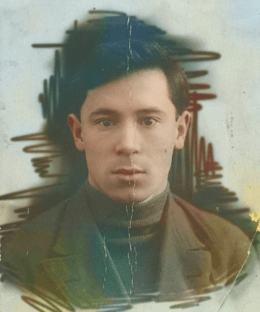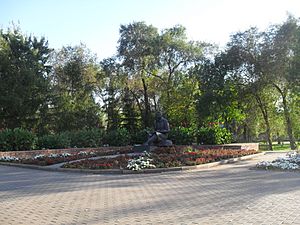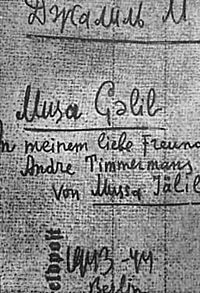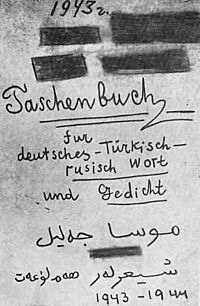Musa Cälil facts for kids
Quick facts for kids
Mussa Jalil
Musa Çəlil Муса Җәлил Musa Cälil Муса Джалиль |
|
|---|---|
 |
|
| Born | Musa Mostafa ulı Cälilev 15 February [O.S. 2 February] 1905 Mustafino, Orenburg Governorate, Russian Empire |
| Died | 25 August 1944 (aged 38) Plötzensee, Nazi Germany |
| Occupation | Poet, playwright, journalist, editor, resistance fighter |
| Nationality | Soviet |
| Period | Interwar period |
| Notable awards | Hero of the Soviet Union Order of Lenin Stalin Prize |
| Spouse | Äminä Zalilova |
| Children | Çulpan Zalilova |
Musa Cälil (Tatar: Муса Җәлил, Tatar pronunciation: [muˈsɑ ʑæˈlil]; Russian: Муса Джалиль; February 15, 1905 – August 25, 1944) was a famous Soviet–Tatar poet and a brave resistance fighter during World War II. He is the only poet from the Soviet Union to receive two major awards at the same time after his death: the Hero of the Soviet Union for fighting against the Nazis, and the Lenin Prize for his collection of poems called The Moabit Notebooks.
Contents
Biography
Early life and revolutionary spirit
Musa Cälil was born in 1905 in Mustafino, a small village in what was then the Russian Empire. His family were junk dealers. He went to a special school called Husainiya Madrasa in Orenburg. His first poems were about revolution and change.
In 1919, when he was just 14, Musa joined a secret youth group called Komsomol in Orenburg. This group supported the Communist Party. He also took part in the Russian Civil War, helping the Red Army even though he was very young. In 1920, he went back to his village and started a pro-Communist youth group called The Red Flower.
Becoming a poet and editor
In 1922, Musa moved to Kazan, which became the capital of the new Tatar ASSR. Many other Tatar poets also moved there. Musa wrote many poems with "Red" in their titles, showing his revolutionary ideas. He worked for a newspaper and studied at a special school for workers at the Oriental Pedagogical Institute. He met other famous Tatar poets and joined a literary group called October.
In 1925, his first collection of poems, Barabız (We are going), was published. These poems often talked about life before the revolution. From 1925 to 1926, he traveled to Tatar and Kazakh villages, encouraging young people to join Komsomol.
In 1927, Musa moved to Moscow. He studied at Moscow State University and worked for the Komsomol's Tatar–Bashkir section. He joined the Communist Party of the Soviet Union in 1929. In Moscow, he met famous Russian poets and became a leader in the Tatar section of the Moscow Association of Proletarian Writers. His poems started to include more feelings and emotions.
After graduating from Moscow University in 1931, Musa became the chief editor of a Tatar children's magazine. He also managed the literature and art section of a main Tatar newspaper. In 1934, he published two more collections of poems. He also translated works by many poets from different parts of the Soviet Union into the Tatar language. In the late 1930s, he started writing longer, epic poems and even wrote four librettos (stories for operas) for the Tatar State Opera.
Fighting in World War II
When Nazi Germany invaded the Soviet Union in June 1941, Musa Cälil volunteered to join the Red Army. He became a war correspondent, writing for a newspaper called Otvaga. His poems during this time were first patriotic, then later focused on the feelings and experiences of people during the war.
In June 1942, Musa's army unit was surrounded by enemy forces. He was badly wounded and captured by the Germans. He spent months in different prisoner-of-war camps.
Resistance and sacrifice
In late 1942, the German army started forming "national legions" from Soviet prisoners of war. One of these was the Volga Tatar Legion, made up mostly of Tatar prisoners. The Germans wanted to use these legions to fight against the Red Army. Musa Cälil joined the German propaganda unit for this legion, using a false name, Gumeroff.
However, Musa and his group had a secret plan. They wanted to sabotage the German plans and convince the legionnaires to turn their weapons against the Nazis instead. They secretly printed and shared anti-Hitler leaflets among the soldiers. They also formed small, secret resistance groups. Their efforts paid off: the first battalion of the Volga-Tatar Legion that was sent to the front lines rebelled. They shot their German officers and joined the Soviet partisans (resistance fighters) in Belarus.
Capture and death
On August 10, 1943, Musa Cälil and his comrades were arrested by the Gestapo, the Nazi secret police. He was sent to Moabit Prison in Berlin. While in prison, he learned German to talk to his cellmates. He also wrote poems in secret notebooks.
Musa and 11 of his friends were sentenced to death on February 12, 1944. They were executed by guillotine at Plötzensee Prison in Berlin on August 25, 1944. His body was never found.
Prison notebooks
Musa Cälil's poems from prison were written in two small notebooks. The first notebook was saved by two Tatar prisoners, Ğabbas Şäripov and Niğmät Teregulov. The second notebook was saved by his Belgian cellmate, André Timmermans. These notebooks were later given to the Tatar ASSR Union of Writers in 1946 and 1947. They were published as two books called Moabit Däftäre (The Moabit Notebook). Musa's wife, Äminä Zalyalova, gave the original notebooks to the National Museum of Tatarstan for safekeeping.
Hero's recognition
After the war, in 1946, Musa Cälil was wrongly thought to be a traitor by the Soviet authorities. But Tatar writers and the Tatarstan state security department proved that he had been working secretly against the Nazis.
In 1953, The Moabit Notebooks were published in Kazan and also in a Russian newspaper. Because of this, Musa Cälil was finally recognized as a hero. In 1956, he was awarded the title of Hero of the Soviet Union. In 1957, he received the Literature Lenin Prize for The Moabit Notebooks.
Today, there is a monument to Musa Cälil near the Kazan Kremlin, and a museum in his old flat in Kazan. His poetry became very popular in the Soviet Union and other countries. A Soviet Tatar composer, Nazib Zhiganov, even wrote an opera about Musa Cälil's life. A small planet discovered in 1972 was also named after him: 3082 Dzhalil.
Writings
Here are some of Musa Cälil's well-known works:
| 1929 | İptäşkä ("To the Comrade") |
| 1934 | Ordenlı millionnar ("The Millions Decorated with Orders") |
| 1935–41 | Altınçäç |
| 1940 | Xat taşuçı ("The Postman") |
| İldar (opera libretto) | |
| 1943 | Tupçı antı ("The Oath of the Artilleryman") |
See also
 In Spanish: Musa Cälil para niños
In Spanish: Musa Cälil para niños




